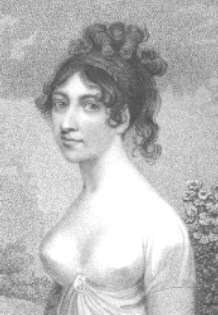Charlotte Dacre
Charlotte Dacre (1771 or 1772 – 7 November 1825),[1][2] born Charlotte King, was an English author of Gothic novels.
Charlotte Dacre | |
|---|---|
 | |
| Born | 1771 or 1772 |
| Died | 7 November 1825 |
| Occupation | author |
Most references to her today are under the name Charlotte Dacre, but she first wrote under the pseudonym "Rosa Matilda", and later adopted a second pseudonym to tease and confuse her critics. She later became Charlotte Byrne upon her marriage to Nicholas Byrne.
Life
Dacre was one of three legitimate children of John King, born Jacob Rey (c.1753–1824), a Jewish moneylender of Portuguese Sephardic origin, who was also a blackmailer and a radical political writer well-known in London society. [3] Her father divorced her mother, Deborah King (née Lara), under Jewish law in 1784 before setting up home with the dowager countess of Lanesborough.[4] Dacre had a sister named Sophia and a brother named Charles.
Charlotte Dacre married Nicholas Byrne, a widower, on 1 July 1815. She already had three children with him: William Pitt Byrne (born 1806), Charles (born 1807) and Mary (born 1809).[1][5] He was an editor and future partner of London's The Morning Post newspaper where the author Mary Robinson was the poetry editor and an influence on a young Charlotte Dacre who began her writing career by contributing poems to the Morning Post under the pseudonym "Rosa Matilda."
Work
As a romance novelist, Dacre cast heroines in a way quite different from the norm of the early 19th century that called for ladies of decorum and good taste. Her style was more like that of the male authors of her era, creating aggressive and often physically violent female characters who demonstrate powerful sexual desires and ambition. Dacre usually constructed this behaviour in a way that can be at least in part justified by the actions of others.
Of her four major novels, Zofloya is the best known today, and sold well on its release in 1806; it was translated into both German and French. In this story, a female character stalks, brutally attacks, and then murders a girl whom she sees as a sexual rival. Yet, despite the brutality, the story relates an underlying moral message that young women should beware the dangers of lust.
Influence
In the literary world, Charlotte Dacre has remained in virtual obscurity for nearly two centuries. However, her work was admired by some of the literary giants of her day and her novels influenced Percy Bysshe Shelley who thought highly of her style and creative skills. She is believed to be one of the numerous targets of Lord Byron's satirical poem English Bards and Scotch Reviewers, mentioned in the lines:[1]
- Far be't from me unkindly to upbraid
- The lovely Rosa's prose in masquerade,
- Whose strains, the faithful echoes of her mind,
- Leave wondering comprehension far behind.
Partial bibliography
- Trifles of Helicon with her sister Sophia King
- Hours of Solitude (Poems) (1805)
- Confessions of the Nun of St. Omer (1805)
- Zofloya (1806)
- The Libertine (1807)
- The Passions (1811)
- George the Fourth, a Poem (1822)
References
- Charlotte Dacre. Kim Ian Michasiw (ed.). Zofloya: or The Moor (Oxford World's Classics). Oxford University Press. pp. xi–xii. ISBN 0-19-954973-7.
- "Obituary". The Times. 9 November 1825.
Mrs. Byrne, wife of Nicholas Byrne of the Morning Post [died] on Monday evening in Lancaster Place, after a long and painful illness
- Rictor Norton (ed.). Gothic Readings: The First Wave, 1764-1840. A&C Black. p. 141. ISBN 9780826485854.
- Baines, Paul (October 2006). "Charlotte Byrne, née King, pseud. Charlotte Dacre (1782?–1825), writer". Oxford Dictionary of National Biography. Oxford University Press. Retrieved 2 March 2011.
- "Charlotte Dacre c. 1772-1825?". enotes.com. Retrieved 1 March 2011.
External links
- Charlotte Dacre, from Wikinfo, licensed under the GNU Free Documentation License.
- Works by Charlotte Dacre at Gutenberg.org.
- Works by Charlotte Dacre at HathiTrust.
- Works by Charlotte Dacre at Internet Archive.
- Works by Charlotte Dacre at Google Books.
- Works by Charlotte Dacre at LibriVox (public domain audiobooks)
